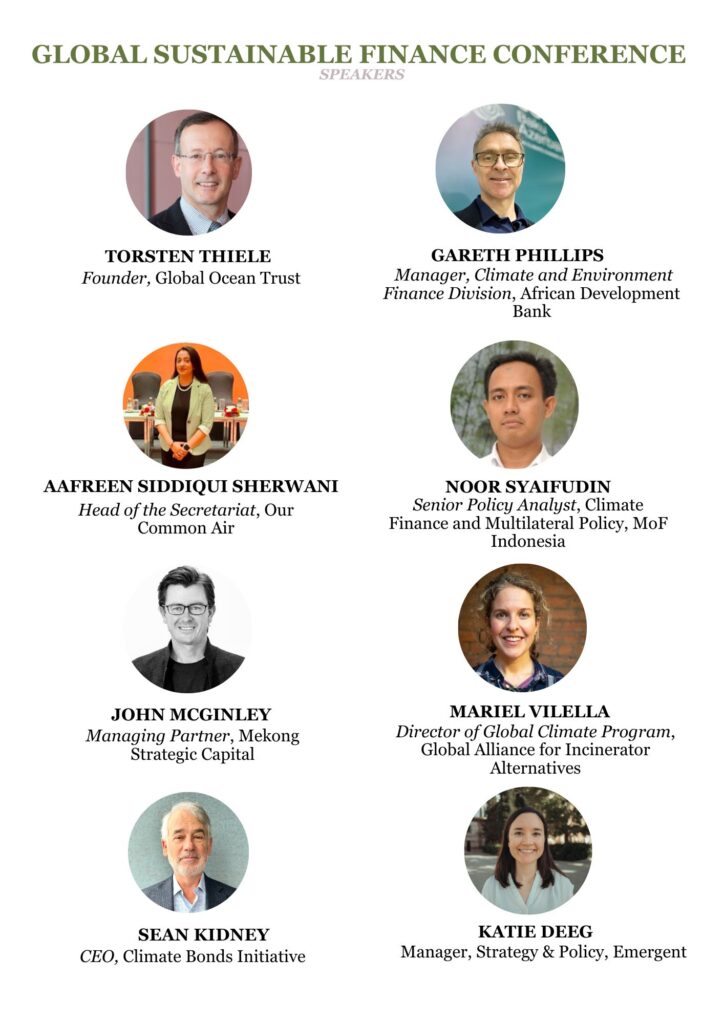Global Sustainable Finance Conference
Webinar
Wednesday, 16th April 2025

Despite announcements at the COP29 meeting to triple climate finance for developing nations, the current annual flow of $850 billion remains significantly below the $2.4 trillion required by 2030 to meet climate targets. Developing countries, often the most vulnerable to climate impacts, face substantial barriers, including inadequate regulatory frameworks, perceived investment risks, and limited institutional knowledge. These challenges are compounded by insufficient private sector participation, underdeveloped carbon markets, and fragmented global collaboration, underscoring the need for actionable and inclusive solutions. The UNFCCC has highlighted the importance of governments and other key stakeholders to better understand the financial needs of developing countries and mobilising financial resources appropriately to support adaptation and mitigation efforts.
Financial institutions, whilst committed to supporting sustainable finance, are looking for solutions to create a win-win situation for all stakeholders. This involves addressing key challenges around governance, data management, reporting standards and compliance. Leveraging climate data through advanced ESG metrics and standardised reporting tools are also key to improving investment decision-making. Blended finance models, integrating public and private capital, have yielded promising results in terms of de-risking green investments and unlocking funding for high-impact projects.
This year’s conference will bring together policy makers, representatives from investment banks, central banks, analysts and other experts to analyse global and regional developments in sustainable finance and its future. We will examine unique advancements and persistent gaps in scaling green finance while evaluating ways to overcome them. Discussions will also delve into the role of digital technologies, including AI and blockchain, in enhancing accountability and efficiency. Carbon markets and pricing mechanisms will be discussed along with the role of cooperation on global and regional levels, robust monitoring systems, and KPIs to ensure accountability. By fostering collaboration, sharing best practices, and addressing structural barriers, the Global Climate Finance Conference 2025 aims to transform commitments into tangible progress, paving the way for a sustainable and equitable future.
Agenda
13:00 – 13:30
Log in
13:30 – 13:45
Welcome address
13:45 – 15:30
Session 1 – Policy, regulation and the roadmap to a sustainable future
- Understanding current trends and statistics in global sustainable finance
- Taking a closer look at current policy gaps and opportunities
- How can banks and insurance companies lead the green transition?
- What are the most significant trends in developing economies?
- Unlocking innovative and promising investment opportunities
- How can regulatory bodies and international organisations work to improve the investment appetite into green technologies?
- Understanding the geopolitics around sustainability
- Making clean technologies more affordable and accessible
15:30 – 15:45
Break
15:45 – 17:30
Session 2 – Scope for innovation, solutions and the future
- Assessing carbon markets and their future
- Improving our understanding of green bonds
- How can AI, blockchain and other emerging technologies affect sustainable finance?
- Developing successful Public Private Partnerships
- Effectively integrating ESG funds into wider investment opportunities
- Addressing key taxonomy challenges
- Building further regional and international cooperation
- Exploring the future of green, sustainable and climate finance
17:30 – 18:00
Closing Remarks and Conclusion

